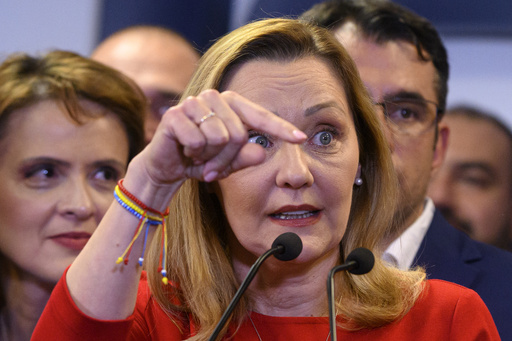
“`html
BUCHAREST, Romania — Despite predictions that Calin Georgescu would secure less than 10% of the vote in the initial round of Romania’s presidential election, the 62-year-old lesser-known far-right populist unexpectedly transformed the political scene. Georgescu garnered the most votes, securing a place in the second round where he’ll face off against reformist Elena Lasconi from the progressive Save Romania Union party.
In a stunning turn of events, he surpassed incumbent Prime Minister Marcel Ciolacu from the Social Democratic Party, marking the first time in Romania’s 35-year post-communist history that the ruling party will not have a candidate in the runoff, scheduled for December 8.
This surprising result has left many analysts questioning how local polls misjudged Georgescu’s support, placing him behind at least five other competitors.
Calin Georgescu, born in Bucharest in 1962, holds a doctorate in pedology—the study of soils. His prior roles include various positions in Romania’s Ministry of Environment during the 1990s. From 1999 to 2012, he represented Romania on the national committee of the United Nations Environment Program.
Once affiliated with Romania’s far-right Alliance for the Unity of Romanians (AUR), he departed from the party in 2022 following internal conflicts and accusations of being pro-Russian while critiquing NATO, the military alliance Romania is part of.
Georgescu expresses strong support for the Romanian Orthodox Church and has sparked controversy for glorifying fascist and nationalist leaders from Romania’s history during the 1930s and 1940s as national icons. He reportedly commended Russian President Vladimir Putin, describing him as “a man who loves his country,” and controversially referred to Ukraine as “an invented state,” although he asserts he is not pro-Russian. Georgescu is married and has three sons.
A surge in social media popularity has been noted as a key factor in Georgescu’s rise. His TikTok account boasts 3.7 million likes and 274,000 followers, gaining substantial traction and visibility in recent weeks.
Reports from Expert Forum, a think tank based in Bucharest, suggest a sudden and substantial increase in engagement on his TikTok account that some observers deemed artificial. As of November 18, he had accumulated 92.8 million views on TikTok, with a notable increase of 52 million views just a week later, ahead of the first-round voting.
The central theme of Georgescu’s recent TikTok posts has been advocating for peace, specifically urging Romania to cease support for Ukraine to avoid being drawn into the conflict. Additionally, a separate TikTok account dedicated to his content, which boasted 1.7 million likes, was recently deleted and featured him engaging in various activities like attending church, practicing judo, and podcast interviews.
Political consultant Cristian Andrei notes that Georgescu’s surprising performance may not necessarily stem from his appeal, but rather from a disillusioned electorate tired of an out-of-touch political elite. He emphasized that Georgescu’s ability to utilize social media effectively filled a gap for many Romanians disenchanted with traditional political parties, suggesting that mainstream parties have failed to adapt to modern communication platforms.
Georgescu’s policy proposals include promoting support for Romanian farmers, reducing reliance on imports, and enhancing local food and energy production. He advocates for a “sovereign” distribution model rooted in participatory democracy, emphasizing values like “Truth, Freedom, and Sovereignty” in Romania’s growth.
In terms of foreign policy, Georgescu asserts that while Romania will uphold its commitments to NATO and the European Union, it expects these organizations to likewise respect their obligations to Romania. He calls for Romania to assume a more active role in international affairs, particularly in light of the ongoing conflict in neighboring Ukraine, which he believes underscores the necessity for diversifying Romania’s external partnerships and bolstering its defense capabilities.
The presidential role in Romania holds considerable power regarding national security, foreign affairs, and judicial appointments. While it has limited influence over domestic issues, the president has the authority to veto parliamentary proposals and dissolve parliament under certain circumstances when a prime minister’s appointment is rejected multiple times.
“`
